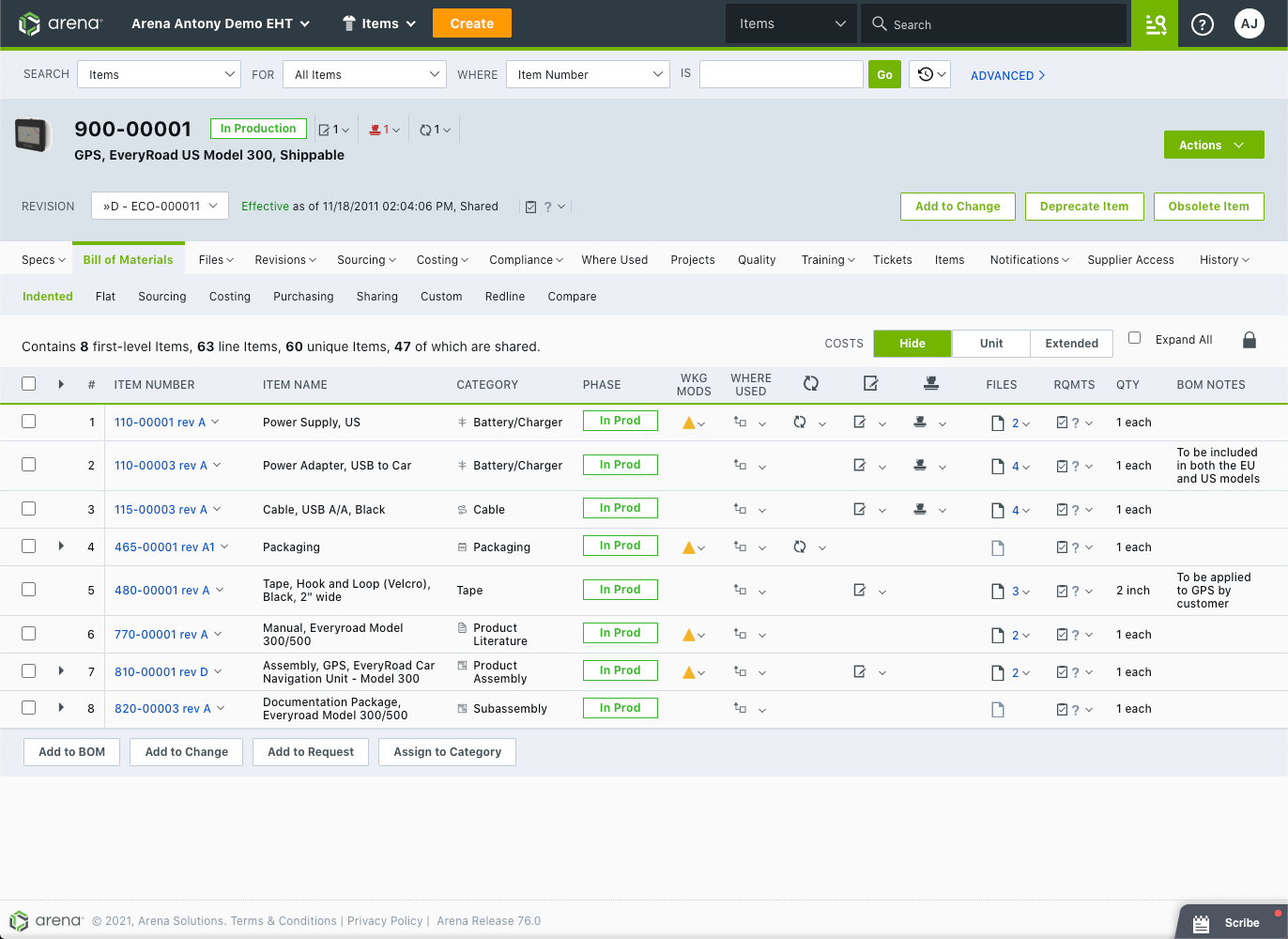Arena Solutions: Complete Buyer's Guide
Cloud-native Product Lifecycle Management (PLM) platform
Arena Solutions is a cloud-native Product Lifecycle Management (PLM) platform designed to streamline product development workflows for mid-market manufacturers and ecommerce businesses. The company positions itself as an accessible alternative to complex enterprise PLM systems, delivering rapid deployment capabilities and regulatory compliance automation without the implementation complexity of traditional on-premise solutions.
Market Position & Maturity
Market Standing
Arena Solutions occupies a focused position in the mid-market cloud PLM segment with approximately 2.1% PLM market share and 561 active customers, reflecting a targeted approach rather than broad market penetration [49].
Company Maturity
Stable operations with responsive customer support and effective project management during migrations, as evidenced by Galvanize Therapeutics praising Arena's seamless migration support [47][54].
Growth Trajectory
Customer satisfaction in cloud accessibility and regulatory compliance automation suggests sustainable positioning within target market segments. The vendor's June 2025 launch of the Supply Chain Intelligence module demonstrates continued product development investment [55].
Industry Recognition
Arena's FDA 21 CFR Part 11 compliance automation delivers measurable value in regulatory compliance-heavy industries [39][47].
Strategic Partnerships
Partnership strategy with Botable.ai and Part Analytics provides AI functionality without internal development investment [45][53][55].
Longevity Assessment
Long-term viability depends on Arena's ability to expand beyond rules-based automation toward genuine AI capabilities while maintaining its deployment speed advantages.
Proof of Capabilities
Customer Evidence
Affirmed Networks achieved 90% reduction in engineering change cycle times through Arena's automated workflows [52]. Galvanize Therapeutics reported 67-second technical file reviews versus 13 hours manually through Arena-FIDO app integration [54][57].
Quantified Outcomes
90% reduction in engineering change cycle times [52]. 67-second technical file reviews versus 13 hours manually [54][57].
Case Study Analysis
Affirmed Networks' success demonstrates Arena's effectiveness in streamlining product development workflows for complex manufacturing environments [52]. Galvanize Therapeutics' implementation showcases Arena's regulatory compliance automation capabilities [54][57].
Market Validation
561 active customers across electronics, medical devices, and IT services sectors [49].
Reference Customers
Affirmed Networks, Galvanize Therapeutics, ILeo, Metal Seal Precision [41][46][52][54][57].
AI Technology
AI Integration Strategy focuses on third-party partnerships rather than native machine learning development. Arena's AI implementation relies heavily on Botable.ai integration for natural-language PLM queries within Microsoft Teams and Slack environments [45][54].
Architecture
Cloud-native architecture that fundamentally differentiates it from traditional on-premise PLM systems, enabling faster deployment timelines and reduced infrastructure complexity [44][48].
Primary Competitors
Cloud-native PLM alternatives like Omnify and Aras, along with enterprise platforms such as Siemens Teamcenter, Dassault Systèmes, and PTC FlexPLM [16][25].
Competitive Advantages
Deployment speed and cloud accessibility. Arena's cloud-native architecture enables 3-6 month implementation timelines for SMBs versus 8-18 months typical for enterprise platforms [51][56].
Market Positioning
Arena serves organizations seeking PLM functionality without implementation complexity, competing on accessibility rather than advanced capabilities.
Win/Loss Scenarios
Wins when deployment timeline and ease of use take priority over advanced AI functionality. Loses to enterprise platforms when customers require native AI capabilities, high-volume scalability, or comprehensive IoT integration.
Key Features

Pros & Cons
Use Cases
Integrations
Pricing
Featured In Articles
Comprehensive analysis of Product Lifecycle for Ecommerce for Ecommerce businesses and online retailers. Expert evaluation of features, pricing, and implementation.
How We Researched This Guide
About This Guide: This comprehensive analysis is based on extensive competitive intelligence and real-world implementation data from leading AI vendors. StayModern updates this guide quarterly to reflect market developments and vendor performance changes.
57+ verified sources per analysis including official documentation, customer reviews, analyst reports, and industry publications.
- • Vendor documentation & whitepapers
- • Customer testimonials & case studies
- • Third-party analyst assessments
- • Industry benchmarking reports
Standardized assessment framework across 8 key dimensions for objective comparison.
- • Technology capabilities & architecture
- • Market position & customer evidence
- • Implementation experience & support
- • Pricing value & competitive position
Research is refreshed every 90 days to capture market changes and new vendor capabilities.
- • New product releases & features
- • Market positioning changes
- • Customer feedback integration
- • Competitive landscape shifts
Every claim is source-linked with direct citations to original materials for verification.
- • Clickable citation links
- • Original source attribution
- • Date stamps for currency
- • Quality score validation
Analysis follows systematic research protocols with consistent evaluation frameworks.
- • Standardized assessment criteria
- • Multi-source verification process
- • Consistent evaluation methodology
- • Quality assurance protocols
Buyer-focused analysis with transparent methodology and factual accuracy commitment.
- • Objective comparative analysis
- • Transparent research methodology
- • Factual accuracy commitment
- • Continuous quality improvement
Quality Commitment: If you find any inaccuracies in our analysis on this page, please contact us at research@staymodern.ai. We're committed to maintaining the highest standards of research integrity and will investigate and correct any issues promptly.